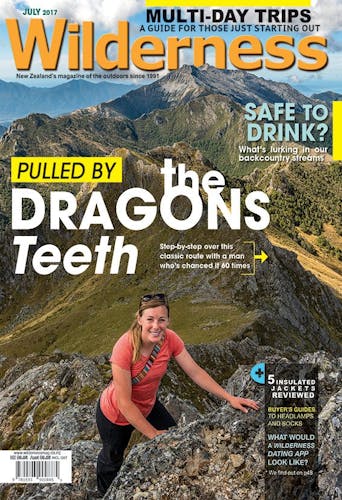What if conservation was turned into a game? Kill a rat, get a point: that’s the premise of Squawk Squad’s pest control programme.
For Fraser McConnell, getting people to care about conservation involves more than taking pretty pictures of birds and providing grim statistics on declining populations.
“The question was, how could we create the most transparent and engaging experience?” McConnell says, crouched next to one of the GoodNature sensor-enabled traps set up in Matuku Link in the Waitakere Regional Park. The answer: “By being really clear about where the money goes, but also being engaged with it every step of the way.”
McConnell, a 24-year-old mechanical engineer, teamed up with a group of young entrepreneurs in late 2016 to launch Squawk Squad, a predator control programme that, using sensors on traps, relays information every time a pest is killed. The data is sent to a base station via low-frequency radio, and using a satellite, a live notification is sent to the Matuku sanctuary and to the trap’s sponsors via email. It costs a one-time fee of $350 to sponsor a trap, which McConnell says can be shared with a group of people to keep the costs down.
The GoodNature traps are self-resetting, which greatly reduces regular maintenance for sanctuary workers and volunteers. The traps contain a long-life lure, and once the trap is triggered, it kills pests immediately. When killed, the pests fall from the trap, which then resets itself up to 24 times using a small CO2 canister.
McConnell and his team started with a beta project, placing 10 traps in the newly established Matuku Link near Bethell’s Beach. In the first eight weeks, 18 rats were killed, and those who sponsored the traps were in full competition mode.
McConnell says the programme allows participants to see the performance of the total project over time. They’ve developed a scoreboard, so sponsors can compete against one another for the most kills.
“We get emails back from the notifications we send to them, with big fist-pumps or hands in the air, really happy that they’ve made a difference,” McConnell says.
To expand the programme beyond Matuku Link, Squawk Squad launched a Kickstarter campaign. They raised $70,000 to develop the next stage of the project, which will include installing 60 traps in Ark in the Park, also in the Waitakere Regional Park. They’ll also further develop the smartphone application, which will be redesigned to show users the location of their trap, including a profile of how many traps they have and the number of pests they’ve killed in total.
“We’d like to make a correlation to how many birds have been saved,” McConnell says, adding that it’s tricky to determine, but they’re working with ecologists to try to provide that statistic. “We’d like to show the positive impact that’s made as well. But, we can also do that with the bigger picture of Ark in the Park, by checking bird noise levels, the rat index, and other metrics that will show the overall performance over time.”
In Matuku Link, two sponsors share the leaderboard with four kills each. But McConnell says they need to evolve from a scoreboard mentality and “really dive into the gamification aspect of Squawk Squad.”
McConnell says this could include having an avatar that levels-up the more it kills pests. “The ability to kill more pests could be increased by the number of traps you have, so, the more shares in traps you have, the more your score goes up, the more experience you gain.”
The application is one of the most important pieces to the programme, McConnell says, because sponsors become more engaged with predator control.
“That’s the really exciting part – we can evolve this into something with the potential to transform the way New Zealanders engage with conservation.”
In the future, McConnell would like to see Squawk Squad set up in sanctuaries all over the country. After Ark in the Park, is a brown kiwi sanctuary, the Thames Coast Kiwi Care, plus two other sites; one near Wellington and another in the Catlins.
“The big goal is to see, over three years, if we can engage 100,000 New Zealanders. We think that will have a massive impact.”








